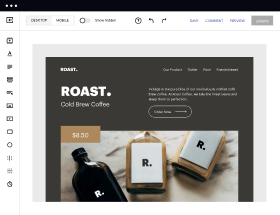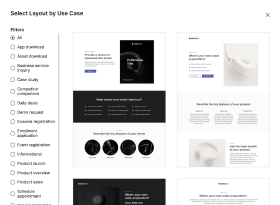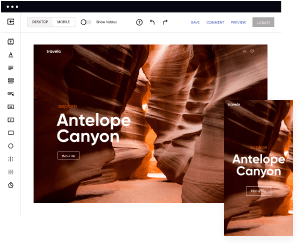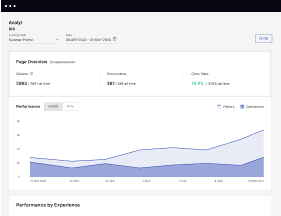Showcase your Traffic coordinators expertise with our HTML page template
Attract clients and showcase your skills with style using our landing page templates for Traffic coordinators. Let's convert those visitors into clients!
Attract clients and showcase your skills with style using our landing page templates for Traffic coordinators. Let's convert those visitors into clients!
Easy to build without coding
With the intuitive drag-and-drop builder, anyone on your team can create high-converting pages without any knowledge of code or design. Make enhancements to your landing page with custom widgets using Javascript, HTML/CSS, or third-party scripts.
Multiple layouts for any industry and goal
Select from 500+ landing page layouts built to boost conversions across industry-specific scenarios. Customize them by adjusting fonts, adding images, and generating on-brand content with the AI assistant. Quickly scale with Instablocks® and Global Blocks that you can save, reuse, and update globally.
Loads fast and looks polished on any device
Every template is responsive, which means they present professionally on any device and load blazingly fast with our Thor Render Engine. You can also power them up with Google AMP technology to deliver an unparalleled mobile experience and drive higher conversions.
Robust analytics & experimentation
Get real-time updates and reporting across all your devices, showing the number of visitors, conversions, cost-per-visitor, and cost-per-lead. Launch AI-powered experiments, run A/B tests, and use heatmaps to analyze user behavior, then optimize your landing page to maximize conversions.
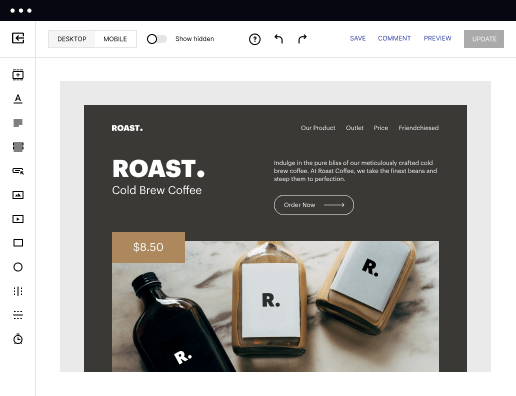
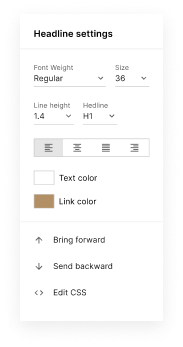
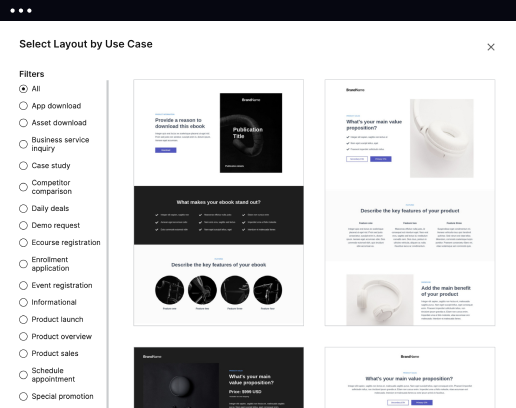
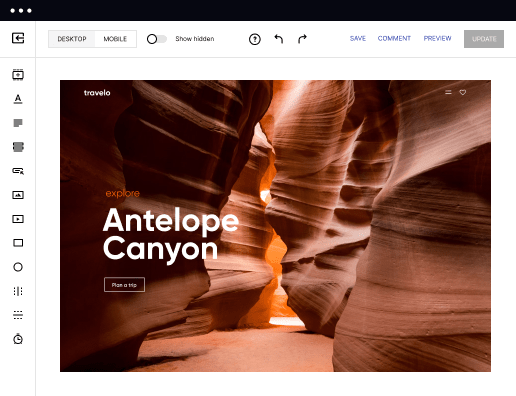
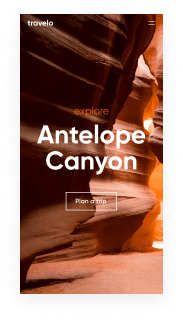
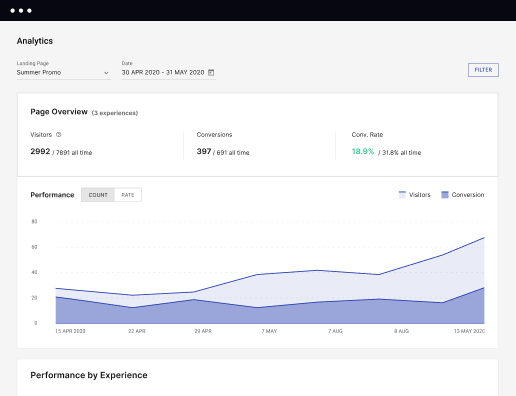
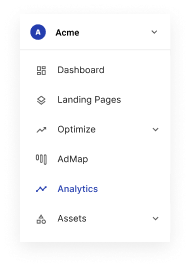
Easy to build without coding
With the intuitive drag-and-drop builder, anyone on your team can create high-converting pages without any knowledge of code or design. Make enhancements to your landing page with custom widgets using Javascript, HTML/CSS, or third-party scripts.
Multiple layouts for any industry and goal
Select from 500+ landing page layouts built to boost conversions across industry-specific scenarios. Customize them by adjusting fonts, adding images, and generating on-brand content with the AI assistant. Quickly scale with Instablocks® and Global Blocks that you can save, reuse, and update globally.
Loads fast and looks polished on any device
Every template is responsive, which means they present professionally on any device and load blazingly fast with our Thor Render Engine. You can also power them up with Google AMP technology to deliver an unparalleled mobile experience and drive higher conversions.
Robust analytics & experimentation
Get real-time updates and reporting across all your devices, showing the number of visitors, conversions, cost-per-visitor, and cost-per-lead. Launch AI-powered experiments, run A/B tests, and use heatmaps to analyze user behavior, then optimize your landing page to maximize conversions.
All the features you need to build lead-generating landing pages
Explore more featuresLearn how to build top-performing landing pages for any goal
FAQs
Leading the way in building high-performing landing pages





Creating impactful landing pages with Instapage
Instapage offers marketers an unparalleled tool for creating optimized landing pages that can drive results and maximize ROI. With a robust suite of features designed for various verticals, including Business Services, Marketing and Advertising, and Tech/SaaS, marketers can confidently launch high-converting landing pages regardless of their budget or team size. This guide presents a step-by-step approach to leveraging Instapage's capabilities.
Step 1: Accessing ready-to-use templates
Begin your journey by exploring the extensive library of over 100 high-converting templates on Instapage. These templates are specifically designed to cater to diverse marketing strategies, helping you fast-track your page setup without compromising on quality.
- Pre-built templates for various campaigns: Choose from a range of customizable templates aimed at different objectives, from lead generation to product launches.
- User-friendly interface: Intuitive drag-and-drop functionality allows non-developers to build professional-looking pages effortlessly.
- Mobile responsiveness: Every template is optimized for mobile, ensuring users have a seamless experience, which can significantly impact conversion rates.
Step 2: Optimizing for higher conversions
With your template selected, the next step is to optimize your landing page for conversions. Utilize Instapage's built-in experimentation tools to analyze user behavior and adjust your content accordingly.
- A/B testing: Experiment with different headlines, content, and layouts to find out what resonates best with your audience.
- Heatmaps: Implement detailed tracking to understand where visitors click and how they navigate your page, allowing for informed optimizations.
- Analytics dashboard: Leverage comprehensive data to assess page performance and adapt your strategies effectively.
Step 3: Personalizing user experiences
To take your landing page to the next level, focus on personalizing the user experience. Instapage provides dynamic text replacement and audience-specific metrics that allow for a tailored approach.
- Dynamic content delivery: Automatically change headlines or other elements to match the ads or keywords that led users to your landing page.
- AdMaps: Align ads to their corresponding landing pages, enhancing the user journey and ensuring a cohesive experience.
- Audience-specific data tracking: Gain insights into how different demographics interact with your content, enabling you to refine your targeting.
By implementing these steps, marketers can transform their campaigns with data-driven insights that lead to increased engagement and conversions.
As you implement these strategies, remember that collaboration with team members is just as crucial. Use Instapage’s sharing tools to gather feedback swiftly.
Ready to start creating impactful landing pages? Sign up for Instapage today and experience the difference it can make in boosting your marketing results.
HTML page template for traffic coordinators
Understanding the role of traffic coordinators
Traffic coordinators play a crucial role in numerous industries, acting as the linchpin that connects various departments and ensures projects flow smoothly from one stage to the next. Their responsibilities encompass everything from scheduling and resource allocation to task management and liaising between teams. Understanding the traffic coordinator's role can help streamline operations, as they are responsible for ensuring that deadlines are met, resources are optimally utilized, and communication is fluid. Their importance in project management cannot be overstated, as they ensure that all parts of the project align with the overall objectives of the organization.
Incorporating HTML templates into a traffic coordinator's daily operations can significantly enhance their productivity. These templates allow coordinators to create structured and accessible digital documentation. Such documentation can be pivotal for effective communication and reporting, as it provides a standard format that ensures all relevant information is captured and easily shared across teams. By integrating HTML-based tools into their workflow, traffic coordinators can focus more on strategy and less on administrative tasks, ultimately driving project success.
Key features of HTML page templates for traffic coordinators
An effective HTML page template for traffic coordinators should include a user-friendly interface design. This means intuitive navigation that makes it easy for all stakeholders to find the information they need without frustration. An ideal template would offer customizable headers, footers, and menus tailored specifically for traffic management roles, ensuring that the interface aligns with the user's needs and preferences. This customization fosters an environment where coordinators can quickly adapt to changes, enhancing their responsiveness.
Additionally, the integration of visual planning tools increases the effectiveness of HTML templates. Features such as Gantt charts and flowcharts allow coordinators to visualize project timelines and task dependencies, simplifying complex workflows. Enhanced data management capabilities should also be included, enabling the use of HTML forms for efficient data collection and feedback. Integrating real-time dashboards that showcase KPIs and metrics can aid in swift decision-making, helping coordinators keep projects on track and aligned with operational goals.
User-friendly interface with intuitive navigation
Integration of Gantt charts for task visualization
Flowcharts for process mapping
HTML forms for data collection
Real-time dashboards for monitoring KPIs
Benefits of using HTML page templates for traffic coordinators
One of the primary advantages of using HTML page templates in traffic coordination is streamlined communication. These templates facilitate clear communication among various internal stakeholders, ensuring that everyone is on the same page regarding project updates, deadlines, and deliverables. Moreover, they create a consistent branding and messaging presence, which is vital in maintaining the image and integrity of the organization. With a standardized template, stakeholders can expect clarity and professionalism in every report or document shared.
HTML templates can also significantly enhance project management efficiency. By incorporating tools for task assignments, deadlines, and a structured roadmap, traffic coordinators can ensure that projects are managed strategically. The structured roadmaps help in professional roadmap management and allow teams to visualize project trajectories, making it easier to adjust strategies as needed. This improved organization leads to increased productivity and better outcomes across all project phases.
Improved communication with standardized templates
Structured management tools for tasks and deadlines
Enhancement in project tracking and reporting
Greater efficiency in time and resource allocation
Facilitation of strategic adjustments for project goals
Practical applications of HTML page templates in business contexts
HTML templates find their applications across diverse contexts in business. Specifically, in digital marketing, they can streamline the development of advertising and promotional plans, allowing marketers to craft effective strategies quickly. They can also serve essential functions in financial contexts, where compliance and fiscal reporting are crucial. By ensuring that data is presented in an organized and professional manner, HTML templates enhance the clarity of financial documents and analyses.
Moreover, tailoring templates for specific industries demonstrates their versatility. For instance, in the medical industry, templates can be customized to meet complex compliance and reporting requirements. Similarly, in the realm of cyber security, HTML templates can be adapted for documentation related to incident tracking and response management. Such tailored solutions ensure that essential processes are well documented and accessible, further improving operational efficiency.
Applications in digital marketing for ad development
Use in finance for compliance reporting
Customization for medical business requirements
Specific use in cyber security documentation
Employment in HR for recruitment tracking
Key components of a comprehensive HTML page template
A well-structured HTML page template should contain essential sections that cater specifically to the needs of traffic coordinators. Key components include a header that showcases the company branding alongside the traffic coordinator's information. This personalization aids in establishing a clear identity for documents shared internally and externally. Furthermore, strategic planning sections should be incorporated to include business proposals and sales pitches, helping coordinators maintain a proactive approach to project management.
To enhance engagement, dynamic elements are vital. Incorporating interactive JavaScript features can transform standard reports into engaging presentations. Likewise, visual aids like organizational charts and detailed diagrams can condense complex information into easily digestible formats. This not only aids comprehension but also leads to better retention of information shared during meetings or client interactions.
Header with branding and contact information
Strategic planning sections for proposals
Dynamic JavaScript features for interactivity
Visual aids such as org charts and diagrams
Sections for budget planning and pricing models
Best practices for implementing HTML page templates
To maximize the benefits of HTML page templates, organizations must prioritize user training and knowledge transfer. Developing training modules for staff ensures that everyone understands how to effectively utilize the templates to streamline their workflow. Documenting best practices and tips can also facilitate this process, helping teams avoid common pitfalls and maximize efficiency. When staff are well-equipped with the knowledge of how to use these tools, it results in enhanced productivity across the board.
Continuous review and updates are crucial for maintaining the effectiveness of HTML templates. Establishing strategies for regular improvement allows coordinators to adapt templates based on feedback and operational changes. Soliciting input from users ensures that templates evolve to meet the ever-changing needs of projects and teams. Additionally, ensuring data security and compliance within these templates is paramount. Guidelines must be established to maintain data integrity while adhering to industry regulations for data protection.
User training and development of training modules
Regular feedback gathering for continual improvement
Adaptation of templates based on operational needs
Establishment of data security guidelines
Focus on maintaining compliance with regulations
Future trends in HTML page templates for traffic coordination
As digital transformation continues to shape project management, traffic coordinators will see significant changes in their roles and responsibilities. The anticipated shift includes advanced capabilities offered by AI and machine learning, which will allow coordinators to predict traffic trends and resource needs with unprecedented accuracy. This shift not only enhances decision-making processes but also fosters proactive planning, which is essential for navigating today’s rapidly evolving business landscape.
Furthermore, innovations in template design and user experience are on the horizon. The potential for more interactive features and customizable options means that future HTML templates will be even more adept at meeting the specific needs of traffic coordinators. Trends suggest a growing integration of emerging technologies, such as augmented reality (AR) and virtual reality (VR), to create dynamic presentations and engaging training sessions. Addressing the evolving needs of traffic coordinators will be crucial for organizations looking to remain competitive and efficient in project management.
AI and machine learning for trend prediction
Advancements in interactive features
Integration with AR and VR technologies
Enhanced customization options for unique roles
Proactive planning capabilities for project management
Ready to skyrocket conversions?
Supercharge your ad campaigns with high-performing landing pages
Get started



